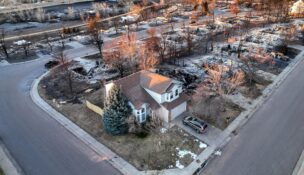Housing Affordability Crisis in Colorado: Denver, Colorado Springs and Grand Junction See No Signs of Improvement
A new study reveals that the supply of housing is falling behind demand, and the ability to purchase a home has become increasingly difficult.
ColoradoBiz Staff //March 21, 2023//


Housing Affordability Crisis in Colorado: Denver, Colorado Springs and Grand Junction See No Signs of Improvement
A new study reveals that the supply of housing is falling behind demand, and the ability to purchase a home has become increasingly difficult.
ColoradoBiz Staff //March 21, 2023//
The real estate market may have cooled by some measures, but the housing affordability crisis is still a serious problem in three major markets — Denver, Colorado Springs and Grand Junction – and isn’t showing any signs of improving.
Common Sense Institute, a Denver-based research organization, released results of three studies focusing on the supply of housing, the demand, permitting activity and an analysis of affordability.
READ: The Economics of Housing Inflation in Colorado — Exploring the Supply and Demand Imbalance
The takeaway: “Our housing crisis continues,” said CSI Senior Economist Steven Byers. “Costs are rising for a limited supply and the ability to purchase a home is shrinking for many Coloradans.”
According to the studies, released Feb. 2, housing supplies in all three communities are falling well behind the demand.
“Recent drops in the levels of permitting in each city indicate a new trend, where there won’t be enough new housing units to meet the needs of the projected population growth and fill the existing gaps and stabilize the market,” Byers said.
Key findings of the housing studies:
- The ability to purchase a home is increasingly difficult. Since 2015, when the Colorado Homebuyer Misery Index surpassed the national average, the affordability of purchasing a new home in Denver has decreased by 101%, by 106% in Colorado Springs and by 96% in Grand Junction. Nationally, affordability has decreased by 86% during that same period.
- Paying the average mortgage takes more work. Since 2019, the year before the start of the pandemic, the number of hours of work at the average weekly wage required to afford a mortgage on the average priced home has increased by 70% in Denver (61 hours to 104 hours), 76% in Colorado Springs (58 hours to 102 hours) and 74% in Grand Junction (57 hours to 99 hours).
- Current levels of permitting for new housing may not be enough. To both meet the needs of the projected population growth and to fill the existing gap in housing supply, Denver will need to permit between 5,187 and 8,151 new residential units per year. Colorado Springs will need to permit between 4,730 and 6,485 units. Grand Junction will need to permit between 526 and 779 units.
To read the complete studies and explore the housing affordability crisis, visit commonsenseinstituteco.com.

























